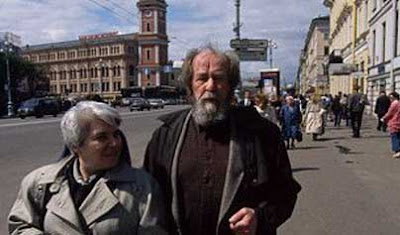The summer break is over, and publication of The New Criterion has resumed as autumn comes on. Perhaps appropriately, the editors have decided to kick off their 4th decade of operation with a reconsideration of Alexandr Solzhenitsyn's Gulag Archipelago.
The occasion is the publication in Russia of a new edition of that amazing work:
After Solzhenitsyn’s death in August 2008, Natalia Solzhenitsyn (his widow), who had also served as his editor and intellectual and spiritual companion, prepared an abridgement of the work (totaling about one quarter of its original 1800 pages) for adoption in Russian high schools. That abridgement, published in October 2010, now joins other works of Solzhenitsyn, such as Matryona’s Home and One Day in the Life of Ivan Denisovich, as required reading in Russian high schools.
It is truly an amazing day when Solzhenisyn has become required reading in Russian schools. He was himself a prisoner in the Gulag, he later found himself with his works banned and with himself in internal exile after his One Day in the Life of Ivan Denisovich (published in 1962 during the momentary Krushchev thaw) fell out of favor with the authorities, and he was eventually banished from his homeland entirely. He was saved from life in prison (and perhaps execution) only because of the fortunate circumstance of his having been awarded the Nobel Prize for Literature for Ivan Denisovich.
The New Criterion article is a lengthy excerpt from Natalia Solzhenitsyn's introduction to the abridgement that she edited. It is beautifully written and captures the sweep of the significance of Sozhenitsyn's life. The reader is furthermore struck by the many points at which Solzhenitsyn's life and work could have been destroyed by those in the Soviet state who had a strong interest in keeping such material from coming to light.
I recall, years ago, reading Solzhenitsyn's account of how the Gulag came to be written, hidden, and finally smuggled out of the Soviet Union (The Oak and the Calf, as I recall.) It read like a spy novel, full of intrigue and multiple narrow escapes -- and had the added benefit of being true. What was at stake was furthermore whether this lengthy, highly detailed work based on the stories of hundreds of first-hand accounts shared with Solzhenitsyn (again, made possible by that brief time of openness under Krushchev, when Russian readers of Ivan Denisovich bombarded Solzhenitsyn with letters in which they told their own stories.)
Today, after the fall of the Soviet Union and the opening of the KGB archives, we take for granted the extent to which we know what happened during the Soviet terror. Perhaps the Soviet Union would still have fallen when it did, even without Solzhenitsyn's labors, but it is difficult to imagine. The publication of the Gulag in France almost single-handedly shut down Communism as a viable political force in the West, and the effect of that alone is difficult to overestimate.
There is no substitute for reading Solzhenitsyn's works themselves, and one can't help but have mixed feelings whenever a literary executor -- even one as close to the author as a man's widow -- undertakes an abridgement that Solzhenitsyn was perfectly capable of doing himself during his lifetime but chose not to. (Mrs. Solzhenitsyn says that they discussed it during the last years of his life and he reluctantly agreed.)
Still, it would be hard to imagine a reader of this essay in The New Criterion not ending it with an appetite whetted for the real thing. I've never read the entire Gulag and probably never will (although my highly accomplished and deeply read beloved has done so -- that, and the unabridged War and Peace besides.) First I would want to finish Solzhenitsyn's entire Red Wheel cycle of novels about the time of transition from Russia under the czars through the Bolshevik Revolution and its aftermath -- and that may never happen, either (partly because I would have to re-read his expanded version of August 1914 -- already a long book when I read it many years ago -- and partly because the second half of the cycle may never be translated into English because of its great length, complexity, and limited potential readership.) So many books, so little time... Sigh.
One final note of interest: Earlier this summer I bought a copy of The New Yorker, as is my wont while traveling through airports, and in it was an article about Natalia Solzhenitsyn's efforts to preserve her late husband's work. The interesting tidbit of the article was the author's observation that Solzhenitsyn is probably the last major author who will have a body of handwritten papers and manuscripts for scholars to study. He wrote everything by hand and hated technology (and much of his early work had to be scribbled on whatever was at hand, even if he had been inclined to type.) Therefore, although he died in the 21st century, his collected papers more resemble those of a 19th century author. For someone like me who sometimes believes he was born in the wrong century himself, it's hard not to love a story like that.

1 comment:
Thanks for the great post. I am so behind on reading already, but I resolve to read this.
Post a Comment